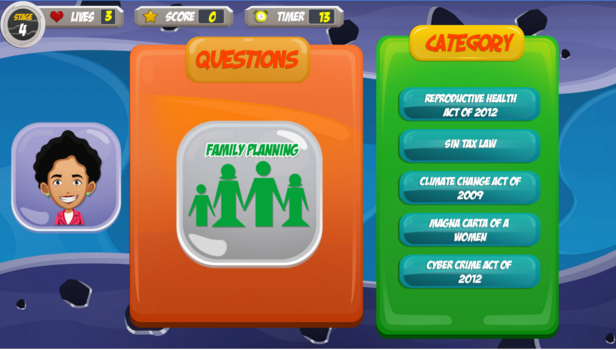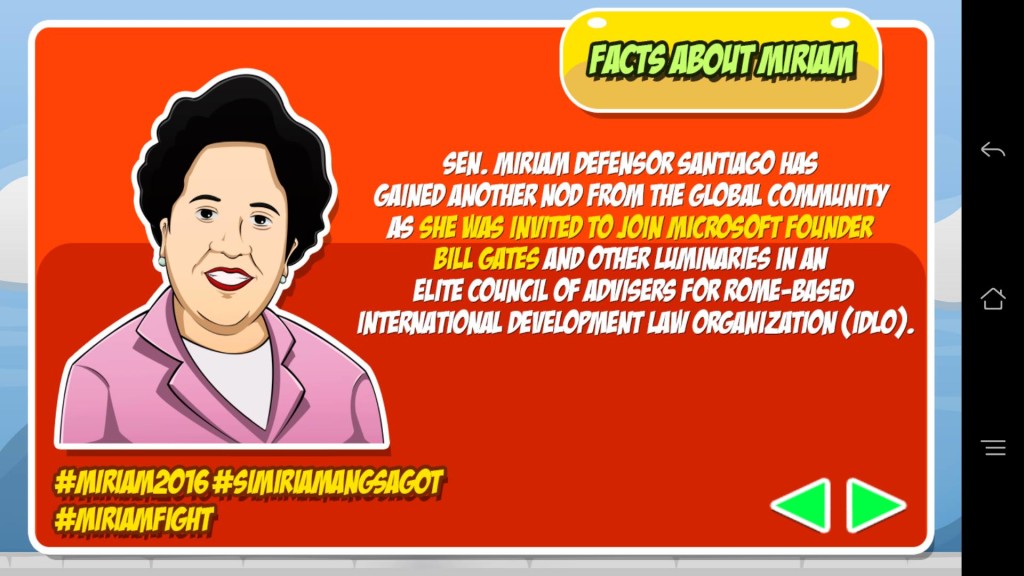Should games advertising political bets be allowed by Comelec?
THE simply titled, “Miriam Game,” for mobile users on the Android platform describes itself as an “Educational and campaign game for Senator Miriam Defensor Santiago.”
The game features simple mechanics, portraying the feisty presidential candidate as a judge playing whack-a-mole in an effort to root out corrupt politicians and thieves away from the innocent public.
As the game progresses, “Miriam Game” brings players different facets of Miriam’s public persona as a public servant. Further levels include a mini-game where players are tasked to deport illegal aliens (mirroring her service at the Bureau of Immigration), a trivia game on legislative issues and her crusade against corruption.
The game, created by Engtech Global Solutions, isn’t particularly polished. The visual graphics are simple for an android game in 2016 and the controls are not as responsive as the other games in the market.
Read more about Philippine eSports at esports.inquirer.net.
What makes “Miriam Game” and “Rody Fight – Game for Change” interesting are the implications they have on the modern campaign trail. Are videogames a new avenue to circumvent election laws?
Legislation to catch up
Legislation has yet to catch up with the advancements of technology, especially in the context of campaign trail. Videogames are not explicitly mentioned in the Omnibus election code. While the law generally covers campaign materials on screen projections, election lawyers differ in opinion on the issue of videogames as election propaganda.
According to the Omnibus Election Code – Article X, Sec. 85, Art. D: “it shall be unlawful to show or display publicly any advertisement or propaganda for or against any candidate by means of cinematography, audio-visual units or other screen projections except telecasts which may be allowed as hereinafter provided.”
In the course of following the story, we spoke to election lawyer Jan Ybañez Perez. According to Atty. Perez, videogames are not covered under prohibited campaign materials as long as the materials stay within the prescribed budget.
The average cost of creating a low-resource mobile game such as Rody Fight and Miriam game amounts to $1,000 to $2,000, says Buko Studios Co-founder Cherry G. Boase.
Boase, a veteran game developer, also sits as a board member at the International Game Developers Association – Manila (IGDA – Manila). According to her, larger-scale mobile games complete with teams of developers could range anywhere from $8,000 to $60,000.
This is on top of the yearly license developer studios pay to publish their game on Google Play, which roughly amounts to P2,000 to P4,000 a year.
In talking with Boase, she says that a game like “Miriam Game” would cost roughly around $2,000.
“…depends on the developer rates and the amount of mini-games inside the games,” says Boase. She noted that the majority of costs for “Miriam Game” would be anchored around developer man-hours and the visual resources that had to be drawn and made specifically for the project.
Impact
According to a 2015 study by Ericsson, the Philippines was expected to reach a smartphone penetration rate of up to 40% (up from the 30% of past estimates) by the end of 2015.
By 2018, smartphone use is expected to reach 70%, according to the Ericsson Mobility Report.
A swelling middle-class and access to affordable smartphones based on the Android platform contributes greatly to the ever growing population of Filipinos who stay connected via mobile means.
With more and more Filipinos turning to mobile apps such as Facebook, YouTube and Twitter to get news and information, videogames might be the next frontier to reach an increasingly interconnected electorate.

